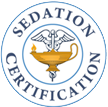Pennsylvania Board of Nursing Review – April 1, 2023
Reviewed by Sedation Certification – January 10, 2024
State Sedation Policy – Yes
Can LPN’s give Sedation? – No
Can RN’s give sedation? – Yes
Can RN’s give Propofol/Ketamine? – No
For questions please contact http://www.dos.pa.gov/ProfessionalLicensing/BoardsCommissions/Nursing/Pages/default.aspx
http://www.pacodeandbulletin.gov/Display/pacode?file=/secure/pacode/data/049/chapter21/chap21toc.html&d=reduce – Regulations
28 Pa. Code § 555.31(a) Anesthesia Services Propofol
§ 21.413. Interpretations regarding the administration of drugs—statement of policy.
(d) As used in this subsection, ‘‘conscious sedation’’ is defined as a minimally depressed level of consciousness in which the patient retains the ability to independently and continuously maintain an airway and respond appropriately to physical stimulation and verbal commands. The registered nurse who is not a certified registered nurse anesthetist may administer conscious sedation medications, under § 21.14, during minor therapeutic and diagnostic procedures, when the following conditions exist:
(1) The specific amount of conscious sedation medications has been ordered in writing by a licensed physician or certified registered nurse practitioner and a licensed physician or certified registered nurse practitioner is physically present in the room during administration.
(2) Written guidelines specifying the medications that the registered nurse may administer in a particular setting are available to the registered nurse.
(3) Electrocardiogram, blood pressure and oximetry equipment are used for both monitoring and emergency resuscitation purposes pursuant to written guidelines which are provided for minimum patient monitoring. Additional emergency resuscitation equipment is immediately available.
(4) The patient has a patent intravenous access when the conscious sedation is administered intravenously.
(5) The registered nurse involved in direct patient care is certified in advanced cardiac life support (ACLS). Provisions shall be in place for back-up personnel who are experts in airway management, emergency intubation and advanced life support if complications arise.
(6) The registered nurse possesses the knowledge, skills and abilities related to the management of patients receiving conscious sedation with evaluation of competence on a periodic basis. This includes, but is not limited to, arrhythmia detection, airway management and pharmacologic action of drugs administered. This includes emergency drugs.
(7) The registered nurse managing the care of the patient receiving conscious sedation medication may not have other responsibilities during the procedure. The registered nurse may not leave the patient unattended or engage in tasks which would compromise continuous monitoring.
(8) The registered nurse monitors the patient until the patient is discharged by a qualified professional authorized to discharge the patient in accordance with established criteria of the facility.
§ 21.145a. Prohibited acts.
An LPN may not perform the following IV therapy functions:
(10) Administer IV medications for the purpose of procedural sedation or anesthesia.
